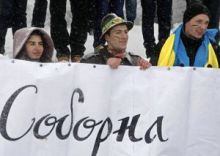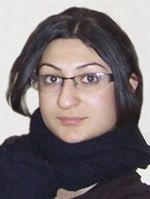Continuing to search for a high-quality alternative, the newspaper Den/The Day is making an attempt to engage young people in a debate on the main Ukrainian problems and the processes going on inside and outside this country. It is Yaroslava Francesca Barbieri, a student at the Sapienza University of Rome, granddaughter of Lina Kostenko, and daughter of Oxana Pachlovska, who started this debate on the newspaper’s pages. It will be recalled that her article “Canada – Ukraine: horizons of ‘just society’” was published later last year (The Day, No. 71, December 8, 2011).
We decided to broaden the circle of this debate and inquire about the opinion of the Ukrainian students who studied abroad. The experience these young people gained (or are still gaining) at European and US universities has, of course, impacted their vision of the key Ukrainian problems and recipes for their solution. We think their reflections on how we can successfully work for joining the progressive world space and, at the same time, restore our own identity inside this country are very interesting.
1. First of all, we are interested in your opinions and impressions of the abovementioned debate.
2. You are part of the Ukrainian intellectual milieu. At the same time, you are witnesses to and participants in worldwide intellectual processes. To what extent do you think Ukraine is integrated today in the European and world context? What is standing in the way in addition to purely political factors?
3. How did your view of the key Ukrainian problems change after you happened to live and study abroad?
4. The fifth Ukraine-EU summit, held in Kyiv on December 19, was another failure for Ukraine, as far as European integration is concerned. But this does not mean that civil society should watch this passively, with its arms folded. To get closer to Europe, Ukraine needs, above all, an energetic effort of the young, progressive, and wise. What is your recipe for bringing Ukraine into the world progressive context? How can we, restoring our own identity inside the country, successfully work to join the progressive world space?
Olena GABRIELIAN, international journalist, expert on the European Union. Education: University Centre for Journalism (CUEJ), Strasbourg, majoring in history of the modern world; Blaise Pascal University, Clermont-Ferrand; Institute of Journalism, Kyiv National Taras Shevchenko University:
1. “Thinking globally, acting locally… I would use this phrase to generalize the essence of Den’s debate among the promising young Ukrainians. Each of them is clearly aware of the fact that Ukraine and every Ukrainian have been set a concrete goal to transform the people who have a centuries-old history and multifaceted culture into a self-sufficient nation to be led by its praiseworthy representatives. When a system is being ruined, it will take time to find new guidelines, identify one’s interests, and devise a mechanism to defend the latter. Today’s Ukraine is a young state, almost of the same age as these young Ukrainians. This generation is shouldering a great responsibility to identify these guidelines and form a new society, a new way of living and thinking. This generation is really free to choose its way of development.”
2. “To assess the extent to which Ukraine is integrated into the worldwide context, one should, first of all, specify what the word “context” means in this case. In a broad sense, it is the milieu in which a certain object exists. So if you take the intellectual milieu of Ukraine and analyze the extent to which it is linked to the milieus of other countries and the effect it is having on worldwide processes, you will see that, by all accounts, the Ukrainian intellectual environment is on the fringes of worldwide processes. But it is a temporary phenomenon because the new elite of a young state is still in the making, and it is still to become aware of the role it is supposed to play in its state and in the world.”
3. “And what do you mean by major Ukrainian problems? In other words, what is Ukrainian and what is major? It is difficult to answer this question because there is a host of problems in Ukraine, and we are still seeking ways to solve them. We were not even on the world political map 20 years ago. So when we are talking about Ukrainian intellectuals in the world, we should, first of all, “introduce ourselves,” so to speak. For instance, there used to be Soviet intellectuals. Now the word “Soviet” is part of history. It gave way to the words “Ukrainian,” “Russian,” “Kazakh,” etc. But the world does not know them so far. Therefore, far from all the Ukrainians, let alone foreigners, know exactly what a Ukrainian intellectual is. This will take time and, naturally, this needs intellectual work that fits the framework of relations between Ukraine and the world.”
4. “I cannot agree that Ukrainian politicians are passively watching Ukraine to be moving away from Europe. Geographically, Ukraine is in Europe, so it is not a very logical definition. And I would draw your attention to the fact that many children of these politicians live and own real estate in Western Europe: this means they do not feel very comfortable in Ukraine. Why should we improve the living standards here if you can leave this country and live by high standards in, say, Austria, Germany, or France? We will, naturally, never come closer to Europe if we are guided by this logic. In Ukraine, patriotism goes by the board even when it comes to political decisions or lawmaking. And, to join the progressive world, we must, above all, build a progressive state. To do so, we need to reconsider our role, be active members of a civil society, and defend our interests in Ukraine as well as Ukraine’s interests in the world.”
Daryna KALENIUK, Fulbright Program graduate:
“What experience of assuming responsibility, in terms of time and history, does my nation have? After centuries of being torn apart by alien nations and countries, the Ukrainians gained independence as recently as 20 years ago. If you consider this age of the state, in historical proportion to the age of a human being, Ukraine is just a newborn baby who can only breathe by itself and cry when it wants something or feels pain. And now the loud-voiced cry of baby Ukraine is heard throughout the world, including the EU and the US, which have pledged to “save democracy in Ukraine.”
“In the 20 years of independence, the Ukrainian nation has still managed to make perhaps the most unique gain that has ever been possible in the past few centuries of its existence – it is the first generation of the Ukrainians who were born and raised in the now independent Ukraine. This could not occur either in the 1920s, or in the Hetmanate, or in Zaporizhian Sich. The last time the Ukrainian people had this opportunity was perhaps about 800 years ago at in times of Kyivan Rus’. But this is a too wide generation gap even in the dimensions of historical time.
“And I am proud that my generation has an opportunity and a mission to start everything from scratch. In 1991, Ukraine did not begin to develop comprehensively, as a state, because there was no generation so far that had grown, from heels to the tops of hair, in an independent and integral Ukraine. A true breakthrough and state-building will occur when my generation gets filled with the wine of life experience and assumes responsibility for Ukraine.
“However, my generation is facing an important challenge, as we can exclusively rely on our own life experience and acquire wisdom by way of trials and errors. Successful countries never leave their young people to the mercy of fate. Mentorship has been the guarantee of success for centuries on end. The older generation has been handing down the wisdom of life to the younger generation. In the UK, for example, a person who has achieved success feels a great need to find a talented young individual and transfer their knowledge and experience to the latter. In the US, the system of higher education is based on a sincere and close relationship between the teacher with a lot of experience under his or her belt and the student who is only full of questions and boundless ambitions. Seniors hand down the real truths to juniors.
“However, my generation was destined to be born as a generation of orphans deprived of seniors. Instead of seniors, we have ignorant robbers and frauds who wear expensive fashionable suits and arouse nothing but shame. Dear robbers, you are teaching us, by your example, the way we should not be 20 or 30 years later.
“My generation has heard tons of reproaches from the older generation of Ukraine.
“Young people are voting with their feet and fleeing abroad – what mindless and unpatriotic youth!
“But whenever we are abroad, our parents say they are missing us, but they still advise and implore us to stay very far from Ukraine because we stand no chances in this country.
“Young people are consumerists pure and simple, who do not revive the state – what unconscientious youth, they only think of sausage!
“Whenever we come to America in the summer to earn some money, the respected ladies and gentlemen of Ukrainian origin consider us poor trash but, at the same time, they complain that corruption is eating into Ukraine’s soul. But those who seek a job in America are the ones who have not learned to give and take bribes, who are not being pushed to parliament by influential parents, and who try to break loose from the system.
“Whenever we are active, the older generation considers us naive and clueless. They advise us to use our brains and look for a cushy place.
“Whenever we go out to protest, we are told we have been used.
“Whenever we pay our last college scholarship for a backpack and a rug and go hitchhiking, those who ought to be seniors call us crazy.
“If we think in the categories of a united Ukraine, we are dubbed Banderites in the east and Moscow-lovers and traitors in the west. Somebody always tries to make us rise from the knees, and only Lina Kostenko keeps on saying that the young people of Ukraine have never stood on their knees to anybody.
“We are thirsty for knowledge, travels, and changes. But there are no seniors who could support, give advice to, and believe us.
“All we have to do is draw wisdom and knowledge from the intricate depths of genetic memory. We keep our hearts open in order to hear intuition. We are stumbling and falling over and over again, but we are learning on our own mistakes, getting painful cuts and bruises.
“But we know how to dream.
“We highly esteem some people among the true Ukrainian elite, who have been stumbling and falling in order to remain seniors for us. As for us, we are getting bruised to restore the continuity of generations and become worthwhile seniors for those who will be seeking, a few decades later, a teacher who could believe them…
“It is only when we restore the continuity of generation that Ukraine will fully and proudly join the family of successful European states.”
Anna STEPANOVA, BI Norwegian Business School, master course in Strategic Marketing and Management:
1. “European integration, European culture, education, life style, etc. are topics which in this way or another have become part and parcel of seminars, trainings, and school and university classes, since globalization and the opening of borders have had its impact on Ukraine too. This emphasizes the urgency of the debate, and the need to hold such discussions more often, for the young Ukrainian men’s and women’s various thoughts and views on our country’s further development deserve to be heard. Now a lot indeed depends on the young, because it is up to them to decide what country they are going to live in, what Ukraine’s future is going to be, and what changes are necessary in the future (or even today) in order to secure the long-wanted growth and welfare in the social, economic, political, cultural, and other spheres.
“It is curious that, as Yaroslava Francesca Barbieri noted in her article, the participants of the debate do fall into two groups: those who speak about Ukraine ‘with burning eyes,’ and those whose commentaries have a tinge of skepticism. However, personally I would add yet another category or, more exactly, a group of realists. These are the people who try to remain unbiased while assessing Ukrainian reality, with all their upsides and downsides. One cannot just blindly believe in a European future for this country. Of course, it has to come – but it requires long years of education, training, analytical work, action, and changes.
“On the other hand, one cannot argue that nothing positive is going on in this country, and be totally disillusioned. Any event inside and outside Ukraine has to be appraised exactly in the context of reality, and not of an idealistic world. Although it is indeed necessary to start with the setting of goals and statement of ideas, similar discussion concerning major processes and challenges in Ukraine need nothing other but a maximally realistic analysis and evaluation.
“Patriotism and faith in their country have always been inherent in Ukrainian intellectuals. It is relieving to see that all these features are intrinsic to the youth of today. However, a pinch of salt would be just as useful to this debate.”
2. “Ukraine is, and has always been, an inseparable part of Europe and the world. Ukraine’s staying outside the European Union or Schengen absolutely does not mean that world and European tendencies do not extend to this country. On the one hand, a partial inpenetrability of our European borders is an obstacle for integration processes. On the other, integration does not necessarily imply building alliances and signing formal agreements. Global integration can begin with a mere opportunity to study abroad and exchange knowledge and skills, an opportunity to travel and find out about other cultures, as well as let international travelers discover our country.
“Any joint research done by Ukrainian and foreign scholars can also be an example – if not of integration, than of international interaction between our country and others. And in this case there is absolutely no need to mention and count the names of renowned Ukrainian academicians (of course, both we and the international community know them fairly well) – because the young Ukrainian scholars’ achievements and international activities are becoming increasingly important. I am convinced that there are plenty of such little steps, which can be examples of Ukraine’s global integration.
“I would answer the question about what blocks Ukraine’s road to global integration with this: history and the shift of emphasis in its goals. History – because Ukraine is a very young state. In the context of the debate concerning the establishment of democracy, I think it is worthwhile to note that world history does not know a single successful example of a rapid establishment of state as a whole or of the democratic system in particular, let alone the impossibility of the existence of democracy today in its original, theoretical definition. The hard process of gaining independence, the economic crises our country was to experience, and the complicated political and social situations certainly leave an impact on the possibility and rate of Ukraine’s global integration.
“In the process of establishing of a nation’s statehood, the principle ‘I want it all, here and now’ will never work. By the shift of emphasis I mean European integration being often associated with international agreements between Ukraine and the EU, thus making them the most important ultimate goal. Global integration presupposes much more, which is why the emphases have to have extended borders and not be bounded by one sphere only. The European Union is but one stage in integration (and not an indispensable one at that), therefore we should not stop there, we must yearn for more. But where we should start is exactly the realization of our own complicity in global and European processes.”
3. “The experience of living in a European country is indeed priceless, because I have had a first-hand experience that, as you only live in Ukraine, you miss a lot of things. The analysis of the system of education reveals striking differences in both teaching methods and progress evaluation. For instance, master courses at European business schools emphasize the solution of practical cases, which maximally train students to deal with real life situations in business – which is exactly what Ukrainian economy graduates so painfully lack. Classroom facilities, access to state-of-the-art laboratory equipment, access to online libraries worldwide, students sports centers, and many other things astonish Ukrainian students who come to study at European universities. At a certain moment you begin to feel very sad about Ukrainian universities, because theoretically we also could well afford European-style schools and universities, but it requires state support and private investment – which, unfortunately, had not been done until now.
“What also strikes is the so-called ‘European lifestyle,’ known from the news and literature, but you can only feel it if you stay for a while in a European country, Norway in particular. It is not only the matter of average income, but also the attitude towards work and daily routine. Of course, many Ukrainian problems look even more acute when seen from European perspective. For one, over the six months I spent in Oslo, I had not seen a single stray cat or dog, and the streets struck me with cleanliness. You learn a lot through comparison, and it makes the desire and necessity to change the situation in your own country ever stronger. I only wish many Ukrainians stopped living by that notorious slogan, ‘it is no concern of mine.’ Turning a blind eye and deaf ear is no solution, albeit it is a simple way out of the situation. Living and studying abroad do not radically influence the attitude or realization of Ukraine’s key problems. What actually becomes acuter, is the desire to change something and reach the level of Western European countries.”
4. “In my view, a formal accession to the EU must not be our sole goal. We can look at Norway as an example. One of the world’s best developed countries is not, and will not be, a EU member. Norwegians themselves account for this reluctance by the fact that they had too long been dominated by other powers, and thus they historically loathe international unions in any shape or form. There is also an alternative explanation: Norway has reached such high level of economic and legal progress that it finds it absolutely uninteresting to unite with other states and take care of other nations, which can prove a burden for it.
“As far as our domestic situation is concerned, the first thing we have to get rid of, in my view, is the inferiority complex. International policy must not be built on the principle ‘first we get in the EU, if they will, and then we’ll somehow get on.’ We need to change the situation drastically, so Ukraine need not humbly knock at the EU door, but be invited to join by the member states themselves. And we have to start from the realization of the fact that although Ukraine is still a young state, but nevertheless a strong player on the global map, with a huge potential.
“Of course we should pin our hopes on young experts, who have real opportunities to secure changes. Among them are the alumni of respectable international universities, including European. Due to their sense of patriotism, and partly altruism, they came back home, since they feel responsible for the future of their country. It is them who have a chance not only to adapt, but also radically overhaul, or even break down the System, which pulls Ukraine back and down. If the System is not changed, we have every chance to get caught in the evil circle forever. The faith in your country and in your own power, as well as real, ‘European-style’ activity, based in education and expertise – all this can serve as the basis for Ukraine’s integration policy today.”










